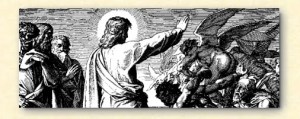After he had finished all his sayings in the hearing of the people, he entered Capernaum. Now a centurion had a servant who was sick and at the point of death, who was highly valued by him. Luke 7:2
Back to Capernaum, where it all began. There’s a centurion stationed in the town, a man who has reason to know of Jesus by reputation. Stories get around, and since some of those stories happened right there in Capernaum, they don’t have to travel far. This officer seems to be stamped from the same mold as Cornelius in Acts 10, also a Centurion stationed in Palestine: a sober, respectable, God-fearing man. Both feared God coming too close to them, perhaps; God-fearer, in this context, means uncircumcised. They admire from afar, until something happens to bring God near. For Cornelius it was a dream; for this man, a crisis.
There’s one indispensable person in household, the man who keeps things in order while the master is on patrol or on maneuvers—the rare slave (or freed servant) whom one can totally trust with business, and who is also a friend. Let’s call him Decius, and suppose that the officer comes back from patrol one day, calls for help removing his armor, and the houseboy appears. What’s this?
“Where’s Decius?”
“He’s taken ill, sir—the physician fears he may die.”
The bottom drops out of an ordinary day. Everywhere the master turns, he bumps his nose against some little matter that Decius always attended to, some loose end left awkwardly hanging, some thought that could not be shared. Perhaps, after a few days spent distractedly, trying to carry on between visits to the bedside, watching a life fade away as its value multiplies, someone mentions that Jesus has returned.
Sharp need brings God near. What the master admired by reputation—for Jesus is a prophet, obviously close to God–becomes painfully relevant. He requests an audience with some of the Jewish elders, with whom he’s maintained respectful, formal relations: “If you would, please speak to Jesus, and pave the way carefully with any kind words that you may feel led to say on my behalf . . .”
He sees them off. Perhaps an hour or two passes while he paces and frets. Suddenly he smacks his forehead: Argh! What am I thinking? I know how authority works. I don’t have to be standing over my soldiers all the time to see that they do their duties—I give a command; it’s done (or else). The prophet is obviously too busy to come himself, but all he needs to do is speak to the evil spirits, or say a word to his all-powerful God. The work of a moment, if he’ll only do it.
“Go, boy, tell him this: Just say the word, Master, and my servant will be healed. Yes? Repeat it to me, so I know you have it . . . Good; now go—hurry!”
More pacing, as the fever rises and his faithful right-hand man tosses and turns in delirium. My right hand—exactly. Without him I’m hobbled, hindered, half-blind.
Perhaps, as Matthew says (Matt. 7:5ff), the officer cast all caution and decorum aside, flung himself out the door and went pelting down the road in search of the prophet. If you want to get something done, better do it yourself. Perhaps he dashed up to Jesus, thrust aside the Jewish elders and gasped out his request.
Whether this centurion delivered it himself, or left it in the mouths of servants or representatives, we know the message: Just say the word, Lord; just say it, and I am completely confident it will happen.
But here’s another word—amazed.
Jesus heard this and was amazed at him . . . and said, “I tell you, I have not found so great a faith even in Israel!” (Luke 7:9)
I’m amazed that Jesus is amazed. I forget his profound humility. He’s already healed every disease, escaped a lynch mob, cast out demons, and established a new order of thinking. He does it all! He knows it all! And yet he allows himself a cleared blue space that’s open to surprise. Not by the unexpected mechanics of creation or the hidden beauties of the earth, but by us. There is room in him to truly connect and honestly compliment where there is any small thing to praise.
It also shows what matters to him, what genuinely pleases him. Not just words, but faith. Real faith, no less real for being pushed roughly against a wall.
And speaking of “the word”–he says it, and the servant is healed. All his servants are healed, sooner or later.
For the original post in this series, go here.
Next>


